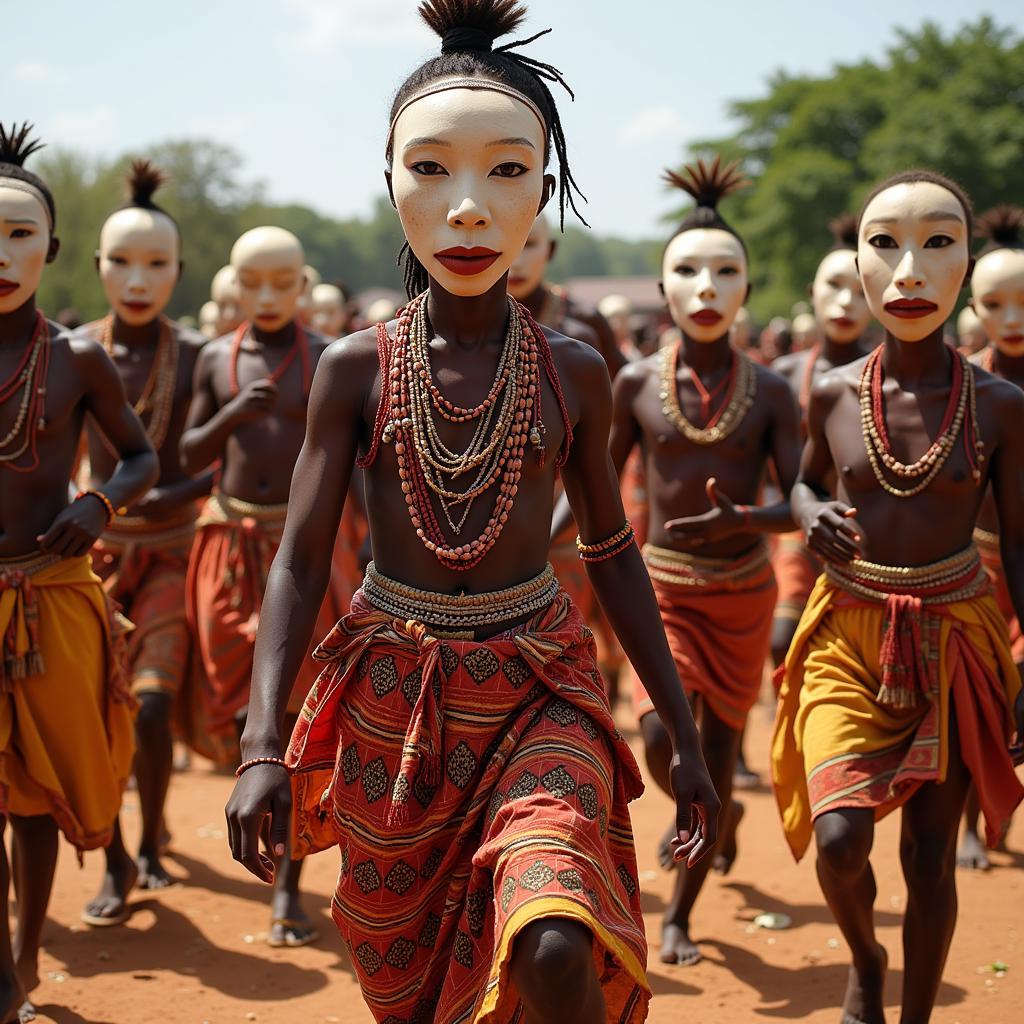African Erotic Dance: A Journey into Cultural Expression
African Erotic Dance is a vibrant and complex subject, often misunderstood and misinterpreted. Far beyond mere sensual movement, these dances are an integral part of African culture, interwoven with ritual, celebration, and social commentary. While the term “erotic” might evoke certain preconceptions, it’s important to approach this subject with sensitivity and a desire to understand the cultural context.
Unveiling the Layers: More Than Meets the Eye
 African Erotic Dance in Ritual Context
African Erotic Dance in Ritual Context
African erotic dance transcends the purely sexual. These dances are deeply rooted in tradition and often carry profound cultural significance. They can be:
- Rites of Passage: Marking transitions into adulthood, marriage, or other life stages.
- Fertility Rituals: Celebrating procreation and the life cycle.
- Spiritual Practices: Connecting with ancestors or deities through movement and rhythm.
- Social Commentary: Addressing societal issues and expressing personal narratives.
For example, in some cultures, specific dances are performed to prepare women for marriage, teaching them about their bodies and sensuality within a safe and ritualized setting. These dances aren’t intended for public consumption but are part of a closed cultural practice.
The Power of Movement: Body as a Canvas
African dance is incredibly diverse, with each region and ethnic group boasting unique styles and interpretations. However, some common threads run through many forms of African erotic dance:
- Emphasis on Rhythmic Movement: The body becomes an instrument, expressing complex rhythms and polyrhythms through intricate footwork, hip isolations, and torso undulations.
- Celebration of the Body: These dances often embrace the sensuality and power of the human form, challenging Western notions of modesty and body image.
- Use of Costumes and Adornments: Masks, beads, feathers, and body paint enhance the visual spectacle and often carry symbolic meaning.
Navigating Cultural Sensitivity: Respect and Understanding
It’s crucial to approach the topic of African erotic dance with sensitivity and respect. Exploitation and misrepresentation have plagued the portrayal of these dances in the past. Here’s how to engage with this cultural expression responsibly:
- Educate Yourself: Research different dance forms, their cultural origins, and their intended meanings.
- Avoid Generalizations: Africa is a vast continent with diverse cultures. What holds true for one dance form or region may not apply to others.
- Seek Authentic Sources: Learn from cultural practitioners, scholars, and reputable organizations dedicated to preserving and sharing African dance traditions.
- Support Ethical Tourism: If you’re interested in experiencing African dance firsthand, choose tour operators and organizations that prioritize cultural sensitivity and community benefit.
Exploring African Erotic Dance: A Journey of Discovery
 The Joy and Community of African Dance
The Joy and Community of African Dance
African erotic dance is a testament to the continent’s rich cultural tapestry. These dances are a celebration of life, sensuality, and tradition. By approaching this topic with respect and an open mind, we can gain a deeper appreciation for the beauty, power, and diversity of African culture.
FAQs about African Erotic Dance
1. Are all African dances erotic?
No, absolutely not. Africa has a vast array of dance traditions, many of which are not erotic in nature.
2. Where can I learn more about specific African dance forms?
There are resources available online and in libraries. Look for books, documentaries, and articles written by African scholars and cultural practitioners.
3. Is it appropriate to attend performances of African erotic dance?
It depends. If the performance is presented ethically, with the consent and involvement of the community it represents, then it can be a respectful way to experience the culture.
4. What should I be aware of when watching African dance performances?
Be mindful of the context and significance of the dances. Avoid making assumptions or judgments based on Western perspectives.
5. How can I support the preservation of African dance traditions?
You can support organizations that promote African dance education and preservation.
Need More Information?
For any questions or inquiries regarding African culture and traditions, please do not hesitate to contact us:
Phone Number: +255768904061
Email: kaka.mag@gmail.com
Address: Mbarali DC Mawindi, Kangaga, Tanzania.
We have a dedicated customer support team available 24/7 to assist you.

